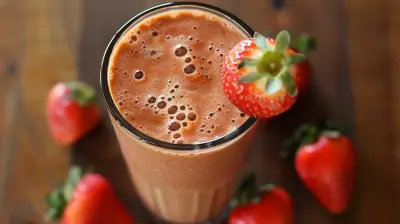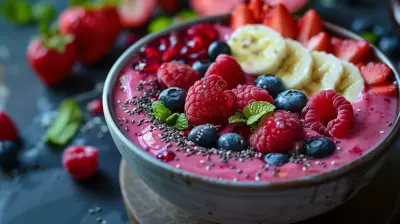Cooking with Herbs and Spices for Maximum Nutritional Benefits
17 July 2025
Let’s talk about something magical that’s probably sitting in your kitchen right now — herbs and spices. They don’t just make food taste better; they can actually make you feel better, too. Yep, you read that right. Those tiny shakers and bunches of green tucked in the back of your cabinet are loaded with nutrients, antioxidants, and healing properties. Who knew your spice rack could be a wellness warrior?
In this post, we’re diving deep into how you can harness the nutritional benefits of herbs and spices when cooking. And no, you don’t have to be a five-star chef to get it right. Whether you're into quick weeknight dinners or slow-cooked Sunday feasts, adding the right herbs and spices can boost your health in a big way. Ready to spice up your life (and not just your food)? Let’s go!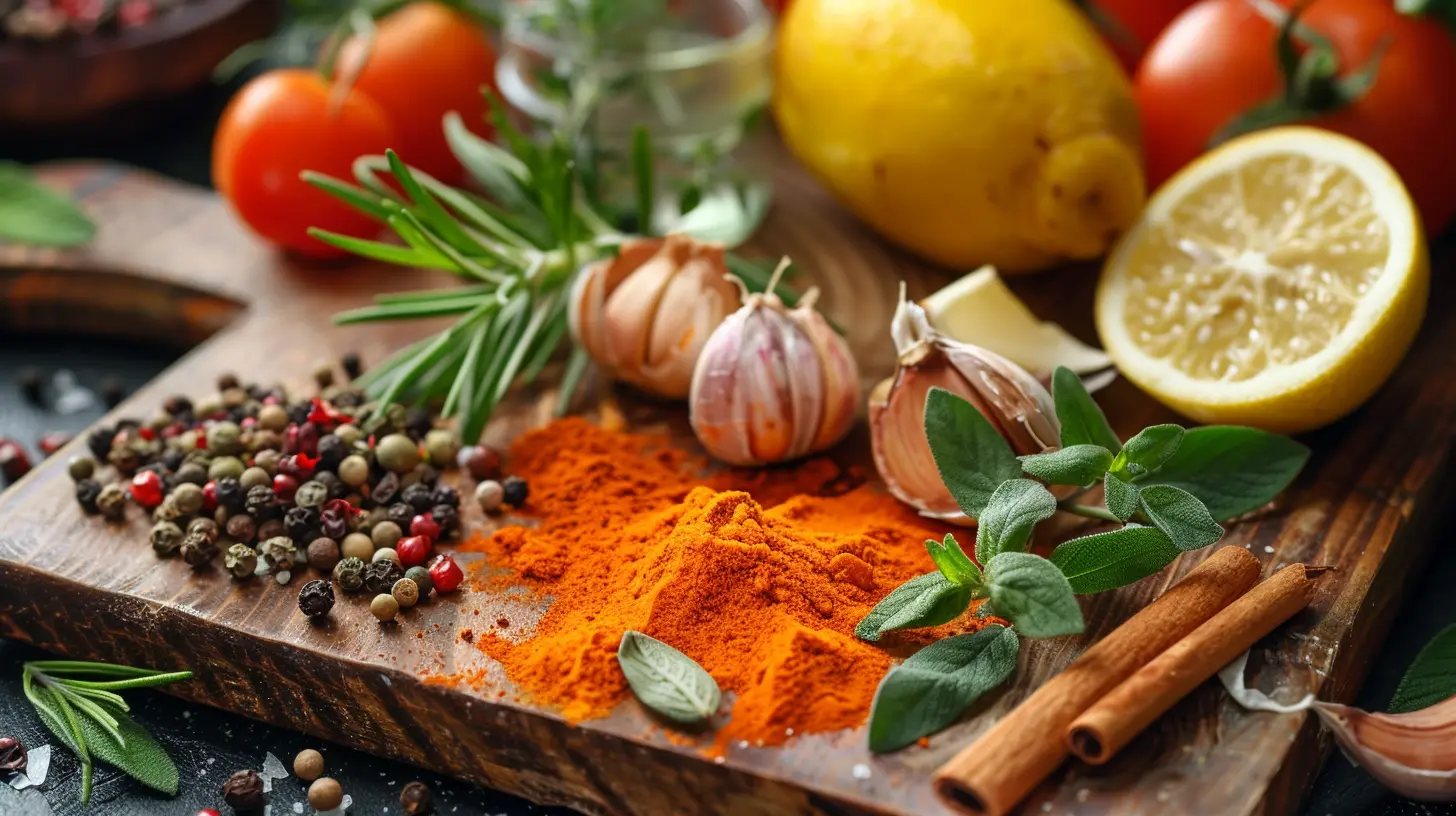
Why Herbs and Spices Are More Than Just Flavor Enhancers
Think of herbs and spices as nature’s multivitamins. They're packed with phytochemicals, antioxidants, and essential oils that protect your cells, support your immune system, and even fight inflammation. Unlike some supplements that come in mystery capsules, these are delicious, natural, and straight from the earth.So what's the difference between herbs and spices? Let’s clear that up real quick.
- Herbs: These come from the leafy green parts of plants—think basil, parsley, cilantro, mint.
- Spices: These come from other parts of the plant like seeds, roots, bark, and berries. Your pepper, turmeric, cinnamon, and cloves fall into this group.
Both are nutritional powerhouses, and cooking with them not only makes your meals stronger in flavor but stronger in health benefits, too.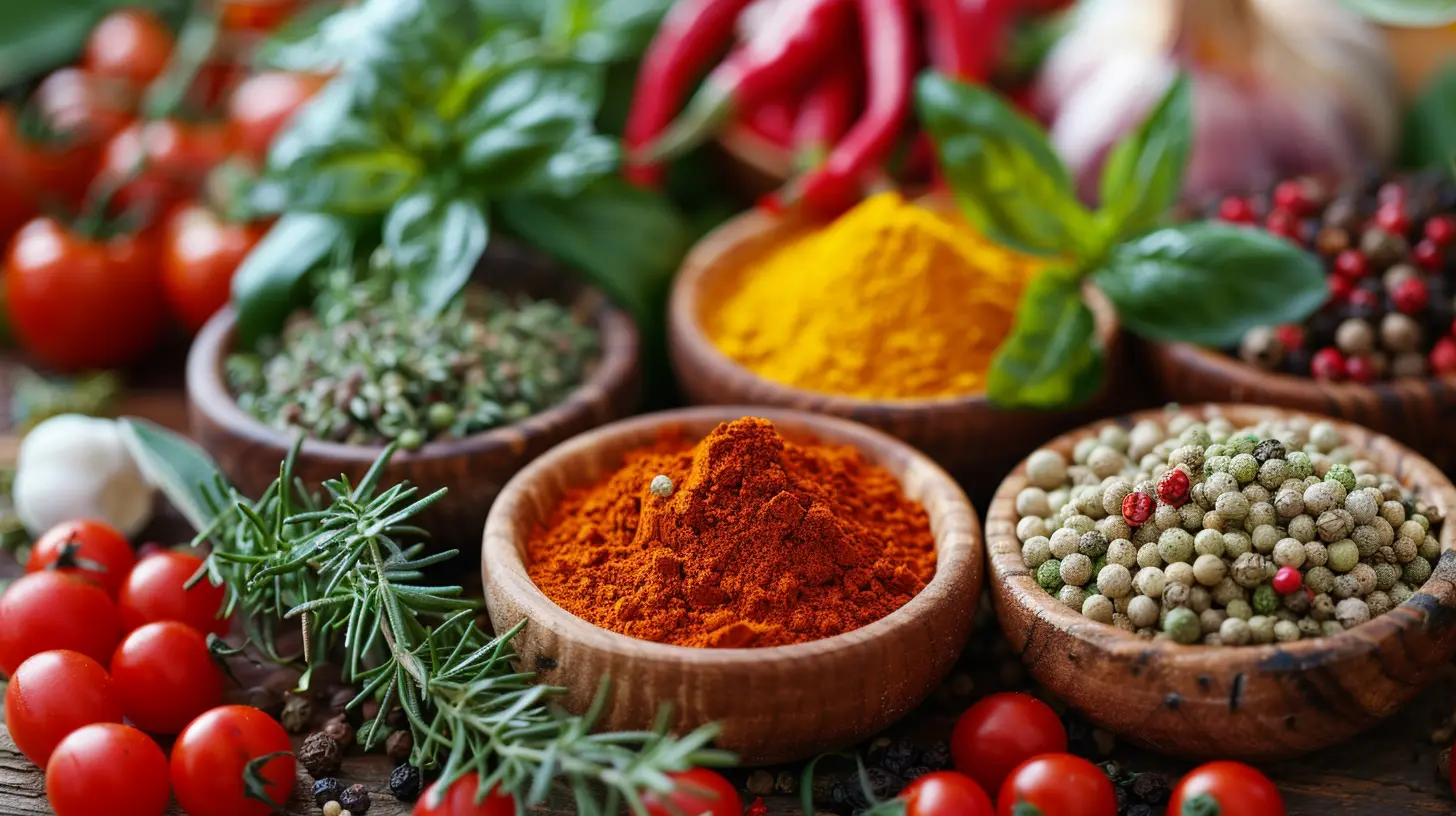
The Nutritional Power of Popular Herbs and Spices
Now to the good stuff. Let’s break down some of the most common herbs and spices — the ones you probably already use — and how they can help your body function at its best.1. Turmeric – The Inflammation Buster
Golden, earthy, and slightly bitter, turmeric is the spice world’s superhero. Thanks to its active compound, curcumin, it's well-known for fighting inflammation and acting as an antioxidant.Pro Tip: Turmeric is fat-soluble, so it absorbs better with a little healthy fat (like olive oil) and a pinch of black pepper to boost bioavailability.
2. Ginger – The Gut Soother
Got an upset stomach? Ginger to the rescue. It’s a natural anti-nausea remedy and a digestion booster. Plus, it has anti-inflammatory properties that ease joint pain and muscle soreness.How to Use: Fresh grated ginger in stir-fries or smoothies is a game-changer. You can even steep it in hot water for a soothing tea.
3. Garlic – The Immune Booster
Garlic doesn’t just keep vampires away. It's packed with allicin, a sulfur-containing compound that helps combat colds, lower blood pressure, and keep your heart healthy.Pro Tip: Let raw garlic sit for 10 minutes after chopping—it boosts its healing compounds.
4. Cinnamon – The Blood Sugar Balancer
Got a sweet tooth? Add cinnamon. It satisfies without the sugar and helps regulate blood sugar and insulin levels. It's also full of antioxidants and anti-inflammatory perks.Tasty Tip: Sprinkle it on oatmeal, toast, or even coffee for a healthy kick.
5. Parsley – The Detoxifier
Don't just use parsley as a garnish. It's rich in vitamins C, A, and K, and it helps flush out toxins from your body. It even freshens your breath!Quick Idea: Add freshly chopped parsley to salads, soups, or blended into pesto.
6. Oregano – The Anti-bacterial Herb
Oregano is more than just pizza’s best friend. It’s rich in antioxidants and has anti-bacterial and anti-viral properties. That’s right — this little guy can help defend your body from unwelcome microbes.7. Cayenne Pepper – The Metabolism Booster
Want to add a little heat—and burn a few more calories while you’re at it? Cayenne pepper contains capsaicin, which boosts metabolism, reduces appetite, and helps with pain relief.8. Basil – The Stress Reliever
Basil does more than jazz up a Caprese salad. It contains compounds that may help reduce stress and anxiety. Holy basil (or Tulsi), in particular, has been used in Ayurveda for centuries as an adaptogen.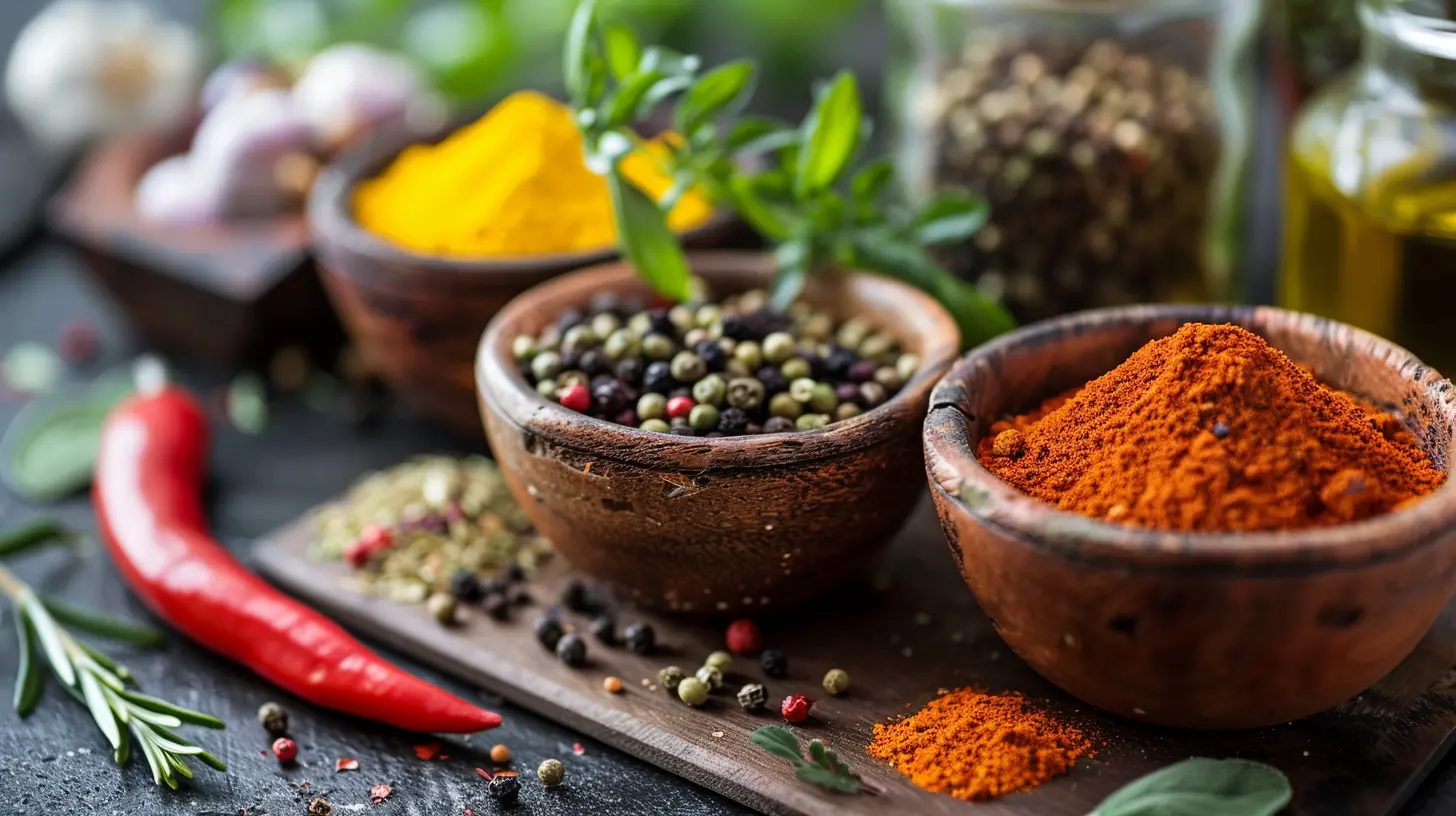
Cooking Tips to Preserve Their Power
Alright, so now you’re sold on how awesome herbs and spices are. But here's something important — they can lose their health benefits if not used the right way. Yup, your technique matters.Don’t Overcook Them
High heat can cause herbs and spices to lose their nutritional punch. Add delicate herbs like basil, parsley, and cilantro at the end of cooking. Hardier spices like turmeric and cinnamon are better suited for early use, especially when sautéing or simmering.Use Fresh When You Can, But Dried Works Too
Fresh herbs have vibrant flavors and more enzymes, but dried herbs still pack a nutritional punch—especially when stored right (cool, dry place away from sunlight). Crumble dried herbs between your fingers before adding them in to help release the oils.Toast Spices Lightly
Want to really bring out their potency and flavor? Toast whole spices like cumin, coriander, or mustard seeds in a dry pan for a minute or two before grinding or cooking. It’s like waking them up from a nap.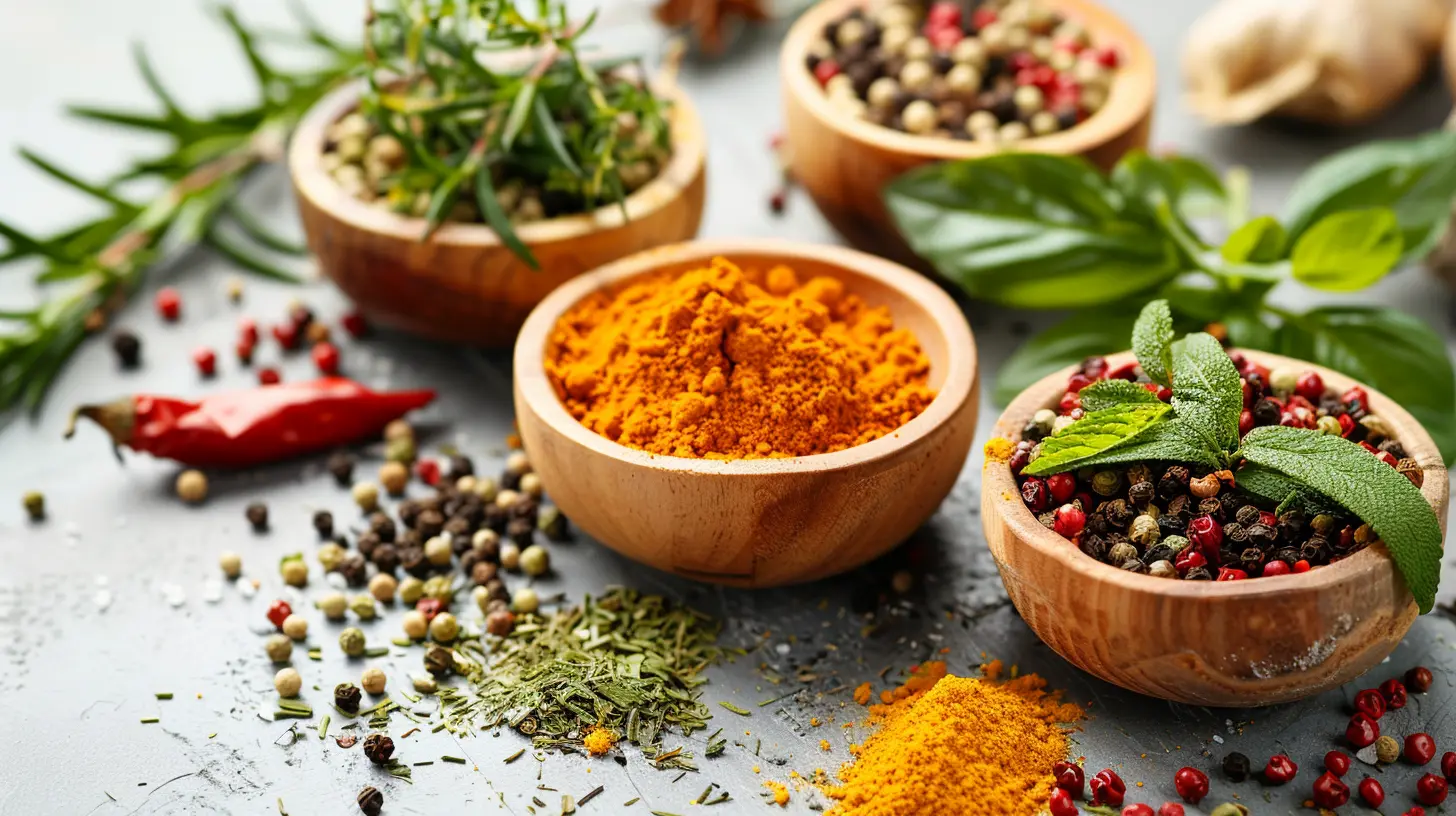
Easy Ways to Add More Herbs and Spices to Your Diet
Not sure how to start throwing all these herbs and spices into your meals? Here are some quick and easy ways to start infusing your daily eats with health-boosting flavor:Upgrade Your Morning
- Add cinnamon or nutmeg to your oatmeal or yogurt.- Mix turmeric and black pepper into scrambled eggs or smoothies.
- Stir in fresh mint or basil to your morning fruit salad.
Spice Up Lunch and Dinner
- Season roasted veggies with garlic, oregano, and thyme.- Add cumin, coriander, and paprika to rice, lentils, or grain bowls.
- Throw parsley or cilantro on top of grilled meats or stir-fries.
Sip on Herbal Elixirs
- Steep fresh ginger and mint for a refreshing detox tea.- Blend basil or rosemary into homemade vinaigrettes.
- Try golden milk (turmeric latte) with almond milk, black pepper, and a bit of honey—comforting and healing.
Combining Herbs and Spices for Even More Health Benefits
Two is better than one, especially when we're talking about flavor + function. Some herbs and spices work better together, enhancing each other’s nutritional power.Here are a few dream teams worth trying:
- Turmeric + Black Pepper: As mentioned, black pepper boosts turmeric absorption.
- Garlic + Rosemary: Together, they may help reduce cholesterol and support heart health.
- Ginger + Cinnamon: Perfect in teas or baked goods, both are anti-inflammatory and great for your immune system.
- Cilantro + Lime: Detoxifying and full of Vitamin C. Plus, it adds a zesty kick to anything.
Herbs and Spice Storage Tips for Maximum Goodness
Let’s be honest: how many jars of dried herbs do you have from five years ago? (No shame, we’ve all been there.)The potency of herbs and spices decreases over time, so here's how to keep them fresh:
- Dry Spices: Store them in airtight containers away from heat and light. Label with purchase dates.
- Fresh Herbs: Wrap in a damp paper towel and refrigerate, or store upright in a glass of water like a bouquet.
- Freezing: Chop and freeze fresh herbs in olive oil using ice cube trays. Pop them out when you're ready to cook.
Final Thoughts: Small Changes = Big Impact
Cooking with herbs and spices isn’t just about adding flavor. It’s about layering your meals with health benefits, one pinch at a time. These tiny ingredients bring decades of traditional medicine into your everyday meals — and your body will thank you.So next time you reach for that salt shaker, maybe choose some garlic and parsley instead. Or ditch the sugary cereal and go for cinnamon in your oatmeal. Small swaps lead to big wins.
The best part? You don’t need to overhaul your diet or spend hours in the kitchen. It's just about being mindful… and maybe getting a little creative.
Grab your favorite herbs and spices and get cooking — your body, your taste buds, and even your mood will reap the benefits.
all images in this post were generated using AI tools
Category:
Healthy CookingAuthor:

Madeline Howard
Discussion
rate this article
2 comments
Audra Benson
Who knew that sprinkling a bit of oregano could turn my salad into a nutrient powerhouse? Honestly, if herbs and spices can make my cooking more exciting and my waistline happier, I'll take a whole herb garden over a gym membership any day! Bring on the flavor!
November 24, 2025 at 4:12 AM

Madeline Howard
Absolutely! Herbs and spices like oregano not only enhance flavor but also pack a nutritional punch. Embracing them can lead to healthier meals and a happier waistline. Enjoy your herb garden!
Daria McDonough
Absolutely loved this article! Cooking with herbs and spices not only boosts flavor but also enhances nutrition. Can’t wait to try these tips in my kitchen! 🌿✨
July 27, 2025 at 2:44 AM

Madeline Howard
Thank you for your kind words! I'm thrilled you enjoyed the article and can’t wait to hear how your cooking goes with those herbs and spices! 🌱✨
